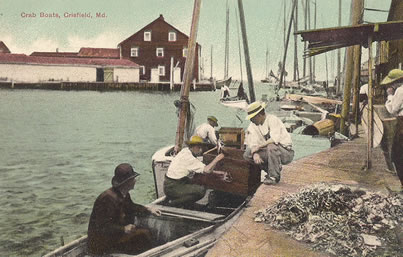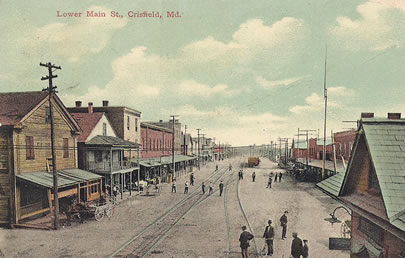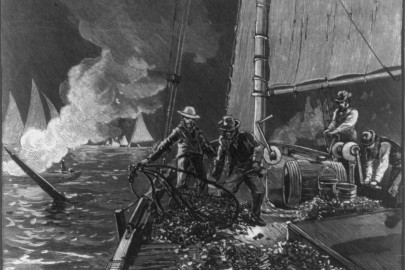Once claiming to be ‘the seafood capital of the world’, Crisfield is now virtually a ghost town. Rita reflects on time, place and crab sandwiches…
It was a dark and starry night, a peaceful rural silence blanketing the sleeping fields … that is until the shots rang out. We were just outside Crisfield, a backwater town on Maryland’s Eastern Shore and my husband’s ancestral homeland. We had parked the car on a grassy patch between the unoccupied farmhouse and the dilapidated barn. My children, young teens at the time, jumped out and began excitedly pointing at the sky. Growing up in a major urban area they had never seen so many stars visible in the night sky. Then the quiet of the countryside was torn apart by several unmistakable shotgun blasts. The rural idyll turned sinister, the remote farmhouse suddenly reminding me of In Cold Blood. My husband seemed strangely unperturbed and began unpacking our bags from the trunk as I hastily shepherded the children towards the house. Once inside in relative safety I suggested we call the police. My husband actually laughed. “It’s probably just family,” he said. “Family?” I was completely confused. “Why would they be shooting at us?” Then the farmhouse phone rang and it turned out to be cousin Bubba or some such name checking up on the situation. As my husband had surmised, knowing the farm was unoccupied and unaware of our plans to visit, he had observed a car turning down the lane and fired off a few warning shots to scare off any possible intruders. Obviously I had a lot to learn about the ways of rural America. The children, for their part, found the episode even more thrilling than stargazing.
My husband and his sister inherited the farm from a childless aunt and uncle. They are descended from long lines of Tulls and Nelsons going back to the original seventeenth century English settlers of the Eastern Shore of the Chesapeake. It is ironic that, while I am an immigrant from England and my husband is American, he is actually more English than I am. I don’t have any English blood. I’m half Irish and half Flemish, having just touched down in England for one generation. My husband, on the other hand, is as purely English as you can get. There was no typically American ethnic melting pot in remote Crisfield, just generations of English farmers and watermen. The churchyards are full of headstones for Tulls and Nelsons, the names still common in the area, and not too far from the farmhouse in the little township of Marion there is a crossroads called Tull’s Corner. (On my way to school in Essex there was a crossroads called Gallows Corner, and by a leap of association Tull’s Corner always reminds me of the haunting first line of Daphne du Maurier’s My Cousin Rachel: “They used to hang men at Four Turnings in the old days.”) Family legend has it that a Tull jumped from an English ship and swam ashore to escape punishment for some transgression. The Nelson side claims more illustrious origins, kinship with the great man himself. My husband visited Trafalgar Square for the first time with the solemnity of one entering a family mausoleum.
I first visited Crisfield to meet my future husband’s mother and aunt. My first impression was of two sweet little old ladies in flowery dresses. Then I saw the steel behind the smiles and realized I was being vetted for my suitability as a wife. They got straight to the point. Was I a Christian? Catching sight of the needlepointed name of Jesus displayed in pride of place on top of the television, I parsed my answer with care. “I was raised a Catholic,” I said. There was an awkward silence, then they seemed to come to some unspoken agreement. “Well, I suppose that’s Christian,” pronounced my future mother-in-law, her reluctance to make the admission quite clear. Suspicion of Catholicism is deeply ingrained in Eastern Shore culture. The area was converted to Methodism in the early 19th century, largely by the efforts of Joshua Thomas, a charismatic preacher known as The Parson of the Chesapeake who spread the Word travelling in a canoe named The Methodist. But having decided to give me a pass on the matter of religion, the two old ladies moved on to another crucial test. At a restaurant overlooking the water I was encouraged to order the local delicacy, a soft shell crab sandwich. In later years my mother-in-law never tired of telling the story of the expression on my face when it was placed before me. A sandwich with eight legs hanging out the sides, looking just like a giant spider. I am afraid of spiders. I learned that I was expected to eat the whole thing, legs and all. Realizing my future happiness was at stake, I closed my eyes and bit into the hideous creature. Much to my surprise it was delicious and I never go to the Eastern Shore now without partaking of soft shell crabs.
Driving to Crisfield from the Washington D.C. area feels like going back in time. You cross the Chesapeake Bay Bridge and Kent Narrows Bridge and following Route 50 soon leave behind the popular tourist towns and the turnoffs for the Maryland and Delaware Atlantic beaches. The land is flat and featureless, all fields and ditches, fresh produce stands dotted along the highway interspersed with the modern ugliness of gas stations and fast food restaurants. English place names are everywhere. Somerset County, Oxford, Cambridge, Salisbury. Some place names commemorate long forgotten royalty. The lovely little town of Princess Anne, county seat of Somerset, is named for a daughter of George II. Past Princess Anne you turn onto Route 413, which runs straight as a Roman road to dead end in Crisfield. J. Millard Tawes, a Crisfield native who was Governor of Maryland during the 1960’s, had the road built especially to speed his journey from the state capital of Annapolis to his beloved hometown. This road played an unusual role in the civil rights upheavals of the 1960’s. Demonstrators in Cambridge, where there was an active ongoing civil rights struggle, planned a march on Crisfield. As my husband’s uncle told the story he was one of a group of town worthies gathered with the Sheriff to prepare for the expected “invasion.” The Sheriff got on the phone with the march leaders and encouraged them to “come on down, y’all are right welcome.” Then he told them to look carefully at the map to check out the route, emphasizing that the road dead ended in Crisfield in the water, there was no other way out of town. He got his intended result. The marchers never came. Today Crisfield seems a place where missing the march of history has happened time and again.
Back in its glory days Crisfield was known, improbably, as “the Seafood Capital of the World.” The downtown area is built on layers of discarded oyster shells, the literal foundation of the town’s wealth. The railroad exported seafood all over America, supporting a population that made Crisfield the second largest city in Maryland in the early twentieth century. But by the time my husband was born those days were over. As the health of the bay deteriorated, the seafood diminished, people left, the railroad turned to rust, and Crisfield became a sleepy backwater, a place apart. My husband’s father, a waterman, joined the exodus, moving to Baltimore to work in the steel mills. For the visitor today Crisfield has an abandoned air. There is none of the “quaintifying” that has helped other small towns in the area attract tourists and boaters. Empty shacks where crab pickers once toiled line the docks, businesses are boarded up, the streets deserted. The Captain’s Galley Restaurant, a Crisfield institution, where we always took my mother-in-law to dinner, closed a few years ago. The main reason people drive into Crisfield these days is to take the boats to Smith and Tangier Islands, still popular tourist destinations for the curiosity of hearing the residents’ Elizabethan accents. There have been half-hearted attempts to cash in on modernization over the years but nothing seems to stick. Luxury condominiums at the water’s edge failed to sell. On a recent visit we saw lights in only two units of the large building and thought how strange it must be for the few residents living among all that empty space. Yet there are compensations; the visitor can feel safe from running into overpriced antique shops and too-cute cafes, a hazard in the Eastern Shore’s more popular towns.
Is there a future for sleepy Crisfield? My husband may have something to do with that. He recently leased some of the farmland to an energy company for a solar farm. Rows of silicon photocells will replace rows of soybeans. But the future may hold something more ominous. When Hurricane Sandy blew through last year the town was inundated. The dock was destroyed, homes flooded, and more businesses forced to close. At the farm, two miles inland, the fields became an extension of the bay, seagulls floating on the water past the farmhouse, harbingers of a watery new age. The land around the Chesapeake Bay is gradually sinking and the sea level is predicted to rise from two to five feet by the end of this century. The most conservative estimate will effectively wipe Crisfield off the map. Yet I wouldn’t count the town out yet. Crisfield hangs on to a stubborn dignity in its decline. Beneath their country charm there is a flintiness to the people that I associate with their distant ancestors, those English exiles, hardened by Civil Wars and religious strife, who braved the ocean to found a New World.














Shouldn’t that be ‘time, plaice and crab sandwiches’…?
There is no plaice in America!
What about that song in West Side Story? ‘There’s a plaice for us, somewhere….’
I’ll stop now.
Not bad, but I’ve heard batter Nige.
For Cod’s hake, you two.
Super post, Rita. If the good folks of Crisfield are hardy enough to withstand a five foot rise in sea level, they are the last word in hardiness.
I ordered some soft shell crabs, lightly battered, recently and have to admit I I was alarmed to be presented by a plate of crispy tarantulas. I had to mash them up into little bits before I could stomach them.
Well a little further South on the Chesapeake Bay in Virginia we (well not me personally) stick them in a bap and munch them as a sarnie.
But I don’t care. After nearly 10 years here I’ve finally found a decent Indian restaurant! But mysteriously they don’t do bhajis..
It is ironic that, while I am an immigrant from England and my husband is American, he is actually more English than I am.
This is, of course, an English understanding of English, not an American understanding. (Although it could be that I don’t understand irony.)